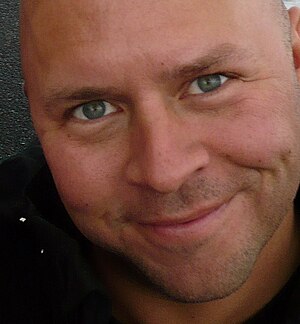 Image via Wikipedia
Image via WikipediaBut this post- I am making an exception. Because it is an interesting point, and I couldn't make the post without linking it posts and articles elsewhere. They are absolutely necessary.
What set me off writing this post is this post by Derek Sivers- he writes that he wanted to be a great singer when he was fourteen, but he was a bad singer with no control of pitch and tone. He practiced for over fifteen years, learning and improving, exploring what he could do better. And after fifteen years, at the age of twenty-nine, he had become good enough for someone to tell him after hearing him for the first time, "“Singing is a gift you're either born with or you're not. You're lucky. You were born with it!”".
He writes,
At 19, I was still practicing two hours a night, but still having a problem with pitch. People kept telling me I was just not a singer - that I should give it up, and find a real singer.
Then I heard a man giving a demonstration of Indian vocal music, and his pitch was so perfect, I went rushing up to him afterwards to ask how he did it.
I said, “How are you able to hit the notes so perfectly dead-on? Are you just natually good at this?”
He said, “No! When I first started singing, not only was I not within an inch of the note - I wasn't within a football field of the note! I was horrible!”
“So how did you do it?”
He jabbed a finger in my chest, and looked me in the eye. “Practice. Thousands of hours of practice, and eventually I got it. I can show you how.”
Impressive, right? And now, he says he is determined to be a great computer programmer, and if it takes him another fifteen years to get there, he is game.
This is one of the most inspiring posts I've read in recent times.
It is not likely that you can become better or best merely through putting in fifteen years of practice- I think you need to have passion, explore new directions and be open to turn back from avenues that don't take you anywhere.
Here I am, a no-good blogger, and this is the only thing that keeps me blogging. Who knows, after another twelve years of blogging, I might be some good at it.
Come back after twelve years if you don't like it now: I promise I will do this better.
Related Links:
This seems to be similar to Malcolm Gladwell's ten thousand hours rule that is discussed in his book, The Outliers. His position seems to be that, among other factors, the fact that you have worked a long time at a given thing gives you mastery over it: practice makes perfect, some people might be naturally good at something, but for most of us, it is sustained hard work that brings in the desired reward.
This could be argued, of course. There are obvious examples of people who didn't put in the required ten thousand hours of hard work- but they did taste success.
It might takes years of hard to get better than others in an establised field of work or enterprise, art. But not so if you are going to be innovative. Seth Godin writes that it would be easier to break through The Dip than in established fields.
You can get through the Dip in an online network or with a new kind of music because being seen as the best in that area is easier (at least for now). You can get through the Dip as a real estate broker in a new, growing town a lot quicker than someone in midtown Manhattan. The competition is thinner and probably less motivated.
I am going to link to another post which you should read in its entirety, because it discusses the intellectual history of the ten thousand hours rule and the exceptions that question the validity of it. Michael Nielson looks at these exceptions and writes it is not just practice, learning has to go along with it: the kind of learning that helps you push back your boundaries, and the kind of learning that opens the doors of imagination and see what others are not even looking for. This quote might seem prescriptive, but it is good: it gives you the right perspective on the ten thousand hours rule:
I believe it’s a mistake to focus on building up 10,000 hours of deliberate practice as some kind of long-range goal. Instead, pick a set of skills that you believe are broadly important, and that you enjoy working on, a set of skills where deliberate practice gives rapid intrinsic rewards. Work as hard as possible on developing those skills, but also explore in neighbouring areas, and (this is the part many people neglect) gradually move in whatever direction you find most enjoyable and meaningful. The more enjoyable and meaningful, the less difficult it will be to put in the time that leads to genuine mastery.

Very good story Baskar. Practice is important and equally important is learning. Repetition of something without learning will only diminish the quality. Repetition with learning improves quality and that's where your practice takes you to the next level.
ReplyDeletePractice, learn, practice learn, practice, learn.....
You won't get to learn if you don't practice. You practice to learn.
ellam peria vivakaram. nan attaikku vallappa.
ReplyDelete